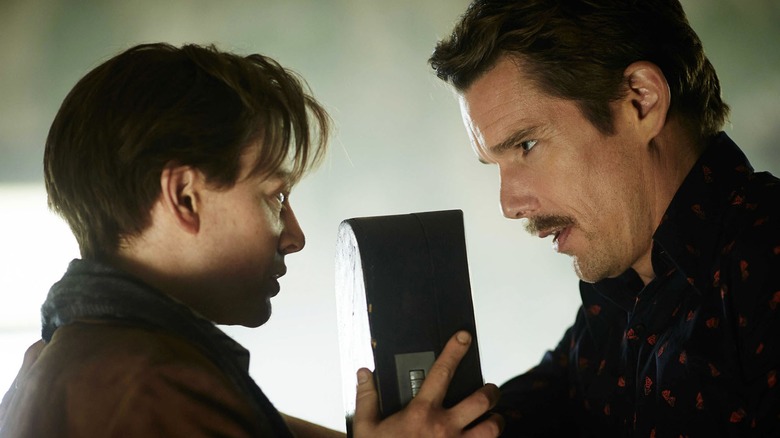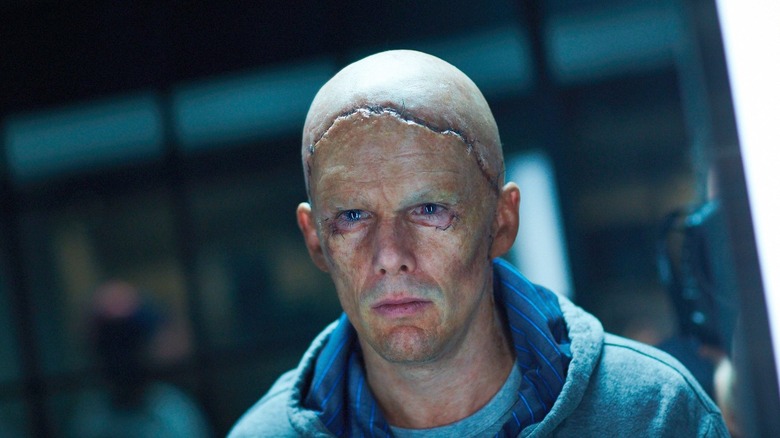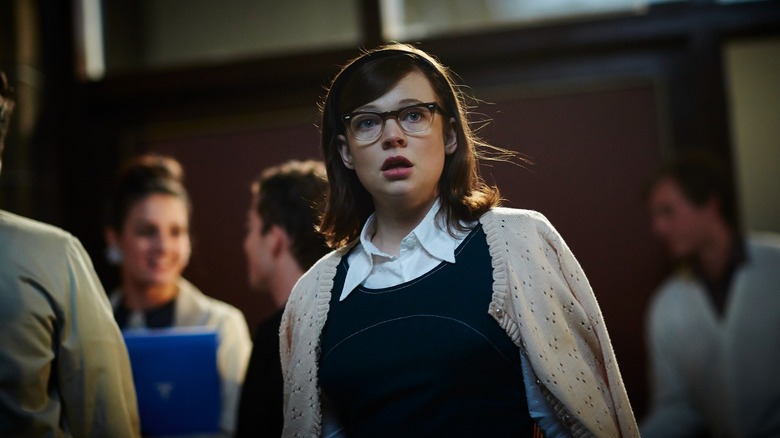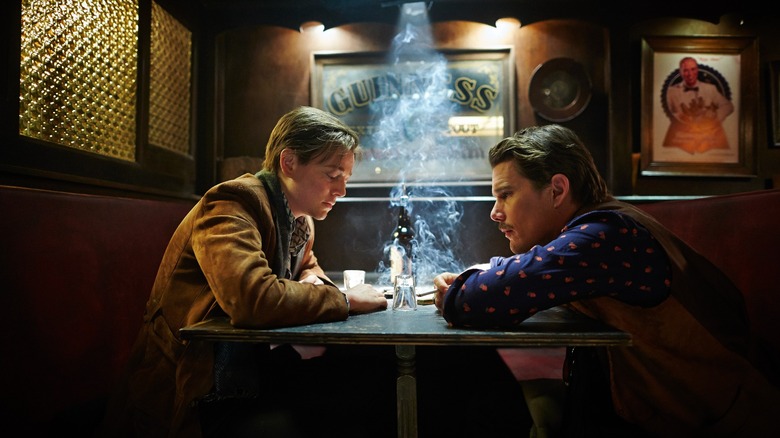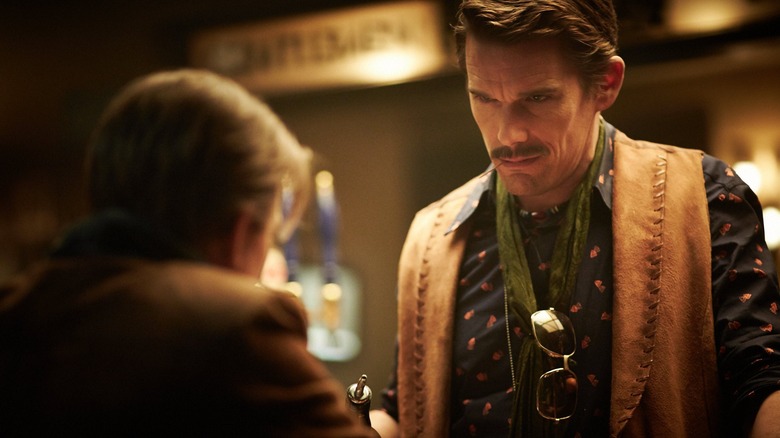The Most Confusing Moments In Predestination, Explained
This post contains major spoilers for "Predestination."
In Michael and Peter Spierig's "Predestination," every temporal thread is connected. As with most time travel narratives that invite a dizzying bootstrap paradox, the 2014 sci-fi thriller pushes the limits of what an infinite temporal loop can achieve, where persons or events end up having no observable origin. Linear understanding of cause and effect has no meaning here; the time-space paradoxes help achieve the impossible, including the existence of the same person within the same timeline (where the fluid nature of identity further complicates causal reasoning). Although "Predestination" can be somewhat heady to absorb during one's first watch, the key to unraveling its most confusing moments is the improbable yet essential truth revealed by the end of the film: every major character in the story is a different iteration of the same person.
The excellent adaptation of Robert A. Heinlein's 1959 short story "All You Zombies" cannot be traced as a tale with a specific beginning or end. Still, for the sake of simplicity, I will be adhering to the film's chronological progression to connect the disparate dots. The cipher to decode the mystery here is that Jane and John (played by Sarah Snook), along with The Barkeep/Agent and The Fizzle Bomber (played by Ethan Hawke), are the same person at different points in time. These diverse identities clash and meet wherever the act of time travel occurs, creating a predestined loop existing within a vacuum — one that cannot be shattered even when causality is broken. There are cruel and nefarious forces that orchestrate the existence of this temporal paradox, scarring the person at the center of this logic-defying catastrophe. Let's dive right into it.
Who are the three people present in Predestination's opening?
"Predestination" opens with a bomb defusal gone wrong. The year is March 1975; a man wearing a coat and a hat is shown mid-mission, attempting to defuse a bomb before being caught in a gunfight. The bomb blows up in the man's face, burning him, and he is rescued by another man, who brings a violin case to help him travel forward in time, in 1992. This mission was part of an attempt to thwart a terrorist named The Fizzle Bomber, who killed over 11,000 people in March 1975. The bombing has already happened, however, and the two men involved in the opening have access to time travel, which explains their efforts to stop it from occurring in the first place.
The man in the coat is John, an agent of the Temporal Bureau formed by a certain Mr. Robertson (Noah Taylor), who employs this agent to put an end to the Fizzle Bomber's threat. The man who helps John with the time travel device is The Barkeep, who is an older version of John and ensures that he makes it to 1992 so that he can get the grafting procedures done to assume the appearance that the Barkeep has now. The third person in the scene, who shoots at John, is the Fizzle Bomber, an even older version of The Barkeep who's experienced psychosis due to the adverse effects of time travel. John and the Barkeep, who are the same person, evolve into the very threat they had been obsessed with eliminating all their lives.
This brings us to Jane — who later becomes John after undergoing surgery — the person the Barkeep converses with at the saloon, "Pop's Place."
What happened to Jane and her child?
After sending John to 1992, the Barkeep travels back to 1970, a time when he has yet to meet John. John, who is a true-confessions columnist known as The Unmarried Mother at the time, brings the Barkeep up to speed about his life so far, unaware of his future involvement with his older self. John was assigned female at birth and named Jane, who had fully developed sets of male and female organs but was unaware of her physiognomy for most of her life. She was abandoned in an orphanage as a baby in 1945 and grew up feeling isolated from most people. In an attempt to clasp onto some purpose, she applied for a Space Corps program spearheaded by Mr. Robertson but was disqualified due to then-unstated seasons. Despondent, she chooses to study further and ends up meeting a stranger she falls in love with. The man abruptly leaves her, only for her to discover that she's pregnant.
After she gives birth, the doctor informs Jane of her intersex nature and states that bodily complications arising during delivery left them no choice but to save the set of male organs. This prompts a need for a surgery, completing her transition into John. It is crucial to note that Jane had no say in this transition; her autonomy was robbed due to the tragic circumstances surrounding the delivery. The baby gets stolen shortly after, adding yet another cruel layer to this cycle of trauma and disenfranchisement.
John, while speaking to the Barkeep, is understandably enraged that his lover at the time left without reason. This prompts the Barkeep to propose an alliance wherein the two will travel back in life to confront the man.
How self-creation and self-fulfilling prophecy work in Predestination
The Barkeep is aware of John's story because he's a future version of him who has traveled back in time to interact with his younger self before the bomb defusal mishap happens. The Barkeep assures John that they can enact revenge on the estranged partner, and the pair travel back together to the night when Jane met her lover. However, during the search, John meets Jane and stumbles upon a heartbreaking realization: he had fallen in love with Jane and conceived a child with her, completing the self-fertilization process. The Barkeep, already aware of this painful truth, steals the child and brings her back to the orphanage in 1945, closing the predestination paradox of birth and self-reproduction.
The Barkeep then travels back to 1963 to convince John to leave Jane at the moment he is supposed to. This, in turn, loops us back to the bomb defusal incident, which puts John on the path to becoming the Barkeep while also closing this temporal cycle. In the meantime, Robertson, the person who set this horrible chain of events in motion, ensures that John/Barkeep evolves into a unique agent with no ties to the past or future (their mere existence is a temporal anomaly manufactured to precipitate a predestined end). This is abuse pushed to its limits; no individual should have to harbor this amount of weight on their shoulders while contending with identities thrust upon them without agency of their own.
This brings us to the final part of this maze, The Fizzle Bomber, who is an older version of the Barkeep. Does John/Barkeep succeed in breaking this toxic cycle? Although the film offers no easy answers, the Barkeep's attempts to change the past most likely fail because it has already happened.
The Fizzle Bomber is the tragic climax of this temporal loop
After closing all possible time loops, the Barkeep travels to 1975 to retire and decommission his time travel device, but it fails to shut down. Noticing that Roberson has left him with the exact location of the Fizzle Bomber, the Barkeep arrives at a time just before the bomb attack, finding the terrorist at a Laundromat. Horrified to learn that the man is his future self, the Barkeep confronts him, and the latter justifies his actions by stating that the bombs serve to prevent mass deaths, having convinced himself of his twisted morality. The Barkeep then kills his future self, keeping the still-working time travel device intact. Does this break in causal coherence change anything?
If we look closer at the visual cues, it becomes clearer that this act changes nothing. The Barkeep does not decommission the device, which means that he will keep using it from time to time. As the effects of time travel caused the Barkeep to adopt such an extreme, violent worldview in the first place, his transformation into the Fizzle Bomber is tragically imminent and predestined to occur no matter what he does to thwart it.
The bombing is an event that has already claimed countless lives and its inherent irreversibility makes everything that Jane, John, and The Barkeep have gone through — who share painful vignettes in different moments in time — hopelessly futile. "Predestination" underlines the harrowing cost of thwarting self-fulfilling prophecies, wherein every action undertaken to avoid a predestined conclusion inevitably steers us towards that very outcome. Needless to say, this is an intensely bleak realization to live with.
